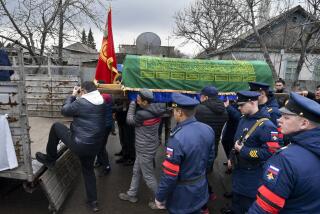Kurdish Rebels Press Fight for Iran Homeland
- Share via
MT. QANDIL, Iraq — Grim-faced, the teen-age boys squatted around a Kurdish guerrilla showing them how to strip and assemble a machine gun. Soon, they would be using the weapon in a conflict that is almost 70 years old--the Kurds’ fight for an independent homeland in Iran.
The Iraqi-backed Kurdish Democratic Party of Iran has in recent weeks stepped up its attacks on Iranian military bases and economic targets.
Guerrilla chieftains at the KDP base camp here in the Iraqi mountains said the youngsters will go into action, as their fathers and grandfathers have before them, in the mountains of northwestern Iran.
“They get three months’ training in weapons, explosives and guerrilla tactics, then join units inside Iran to carry out hit-and-run attacks,” said the camp commander, who would identify himself only as Salam.
It is a war that has largely been overshadowed by Kurdish campaigns in neighboring Turkey and in Iraq itself. In southeastern Turkey, the outlawed Kurdish Labor Party has been fighting a guerrilla war for five years to establish a separate Marxist state.
About 20 million Kurds--Sunni Muslims of Aryan stock--live in an overlapping area where the borders of Soviet Armenia, Iran, Iraq, Syria and Turkey converge, a region once known as Kurdistan.
Iraq, Iran and Turkey all have faced rebellions by their Kurdish minorities. But Iraq is nonetheless backing the Iranian Kurds in an extension of its decades-old rivalry with Iran.
Iran backed Iraqi Kurds in their war against the government in Baghdad during the 8-year Iran-Iraq war. Syria aids Kurdish fighters in Turkey.
The KDP fighters, clearly with Iraqi consent, stepped up their attacks after their veteran leader, Abdul Rahman Qassemlou, was assassinated July 13 in Vienna.
His successor, Sa’eed Badal, said Qassemlou went to Vienna in response to an offer from Iran’s President Hashemi Rafsanjani to negotiate an end to the Kurdish rebellion.
Badal said he believes Qassemlou was killed by agents of radical Iranian factions in an attempt to torpedo Rafsanjani’s efforts to end the mountain war, a move that would have strengthened his credibility as a pragmatist.
Badal said the KDP has turned down an Iranian proposal to resume negotiations because “we no longer trust them.”
The guerrillas, known as Peshmergas, or “those who face death,” say hundreds of young Iranian Kurds have joined them in recent months.
Kurdish chieftains decline to divulge their strength but claim that they are pinning down some 200,000 Iranians. Diplomatic sources in Baghdad estimated that as many as 2,500 KDP guerrillas are in Iraq, with thousands more operating inside Iran.
“Everybody in my village said the Peshmergas are working for a better future for the Kurdish nation, so I decided to join them,” said Farouk Hassan Pour, 14, who trekked across the mountains for seven days until the guerrillas found him.
About 200 youngsters are undergoing guerrilla training in this camp high in the northern Iraqi mountains overlooking the Iranian border.
In the camp are about 1,000 guerrillas, dressed in their distinctive baggy trousers and turbans. Several thousand Kurdish women and children live in villages in the surrounding valleys.
The KDP runs the camp, but the area is under Iraqi military control. The guerrillas are not allowed to leave without Iraqi permission.
The Kurds grow their own vegetables and tend their cattle in the lush uplands. The Iraqis provide flour, rice and fuel oil.
A rehabilitation center has been set up in the camp for guerrillas who have lost limbs. Among the 30 undergoing therapy is Ismail Muradi, 23, who lost an arm in a recent raid.
“I don’t care if I have to live in this camp, deprived of the good things of life, for 50 years, so long as the next generation of Kurds can live as free human beings,” said Muradi, who joined the guerrillas last year.
A five-member French medical team from two relief agencies, Medecins Sans Frontieres and International Medical Aid, operates a makeshift hospital in the base. The team alternates with others who spend three-month tours in the mountains.
“Conditions are pretty primitive,” said Jean Breveau, a surgeon from Paris who is on his third tour. “We’ve eliminated serious diseases, but there’s a lot of malnutrition and back pains, which are common among mountain people.”
Breveau, who also has worked in Africa and with Tamil rebels in Sri Lanka off southern India, said he misses life in Paris and his family.
“But these people need my help more than the people of Paris,” he said. “There’s a great satisfaction when you save someone who would have died if there had been no surgeon.”
The Kurds were promised an independent state in the Treaty of Sevres of 1920. But the great powers sliced up Kurdistan among Iran, Iraq and Turkey.
Since then, the Kurds have been in a constant state of revolt against one or more of these states. The Kurdish revolt in Persia, which later became known as Iran, began in 1920.
More to Read
Sign up for Essential California
The most important California stories and recommendations in your inbox every morning.
You may occasionally receive promotional content from the Los Angeles Times.













